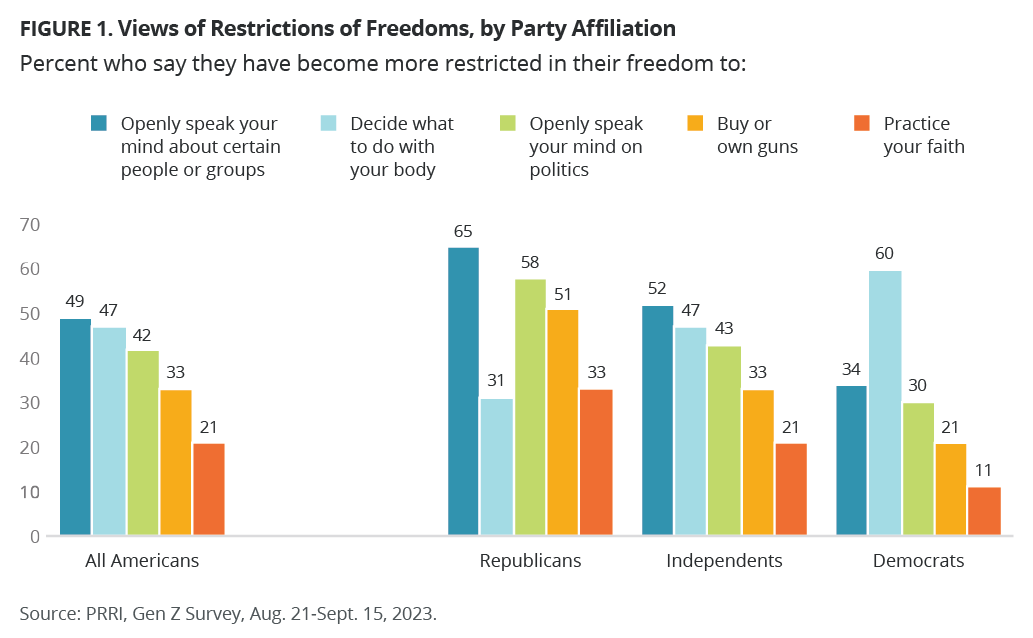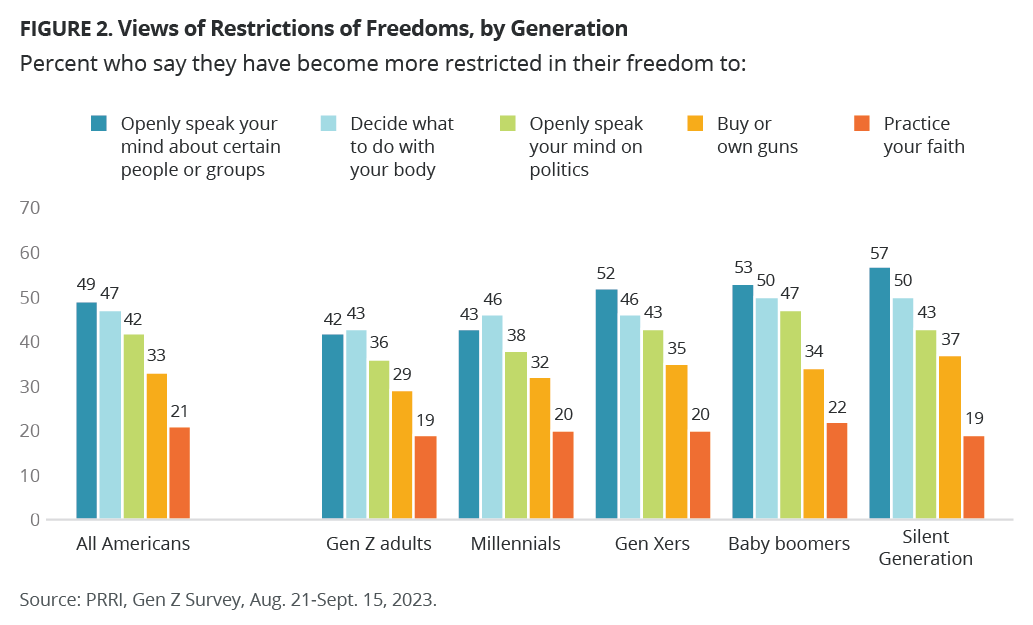Americans are deeply divided in their assessments of how their freedoms have shifted in recent years, particularly along partisan lines. PRRI’s 2023 Gen Z Survey asked Americans whether they feel they have become more restricted or less restricted in their freedoms to openly speak their mind on politics or about certain people or groups, to decide what to do with their body, to buy or own guns, and to practice their faith.
This Spotlight Analysis takes a closer look at which Americans are more likely to feel these freedoms have been restricted in recent years. We find that Republicans are more likely to feel their freedoms have been restricted — except for bodily autonomy, which Democrats are more likely to feel is restricted. Overall, older generations generally feel their freedoms are being restricted more than younger generations.
Freedom to Speak One’s Mind About Certain People or Groups
Around half of Americans (49%) feel that their freedom to openly speak their mind about certain people or groups has become more restricted in recent years. Two-thirds of Republicans (65%) feel this way, making them significantly more likely to express this sentiment than both independents (52%) and Democrats (34%).
Members of the Silent Generation (57%) are the most likely to say that their freedom to speak their mind about certain people or groups has become more restricted. Over half of baby boomers (53%) and Gen Xers (52%) feel this way, compared with around four in ten millennials (43%) and Gen Zers (42%).

Freedom to Decide What to Do with One’s Body
Nearly half of Americans (47%) feel that their freedom to decide what to do with their body has become more restricted. Democrats (60%) are significantly more likely to feel more restricted than independents (47%) and Republicans (32%). Democratic women (65%) are particularly likely to say that their freedom to decide what happens to their body has become more restricted, compared with 55% of Democratic men and 37% of Republican women.
Members of the Silent Generation and baby boomers (both 50%) are slightly more likely than younger generations, including 46% of both Gen Xers and millennials and 43% of Gen Zers, to feel that their freedom to do what they want with their body has become more restricted.
Freedom to Speak One’s Mind on Politics
Around four in ten Americans (42%) feel that their freedom to openly speak their mind on politics has become more restricted. Republicans (58%) are significantly more likely than independents (43%) and Democrats (30%) to feel more restricted in this regard.
Baby boomers (47%) are the most likely to feel that their freedom to speak their mind on politics has become more restricted, followed by members of the Silent Generation and Gen Xers (both 43%). Millennials (38%) and Gen Zers (36%) are less likely to feel this way.
Freedom to Buy or Own Guns
One-third of Americans (33%) feel that their freedom to buy or own guns has become more restricted in recent years. A slim majority of Republicans (51%) share this sentiment compared with one-third of independents (33%) and two in ten Democrats (21%).
Belief that the freedom to own guns has become more restricted increases slightly with age: 29% of Gen Zers, 32% of millennials (32%), 35% of Gen Xers, 34% of baby boomers, and 37% of members of the Silent Generation agree.
Freedom to Practice One’s Faith or Religion
Around two in ten Americans (21%) feel that their freedom to practice their faith or religion has become restricted. Republicans (33%) are more than 10 percentage points more likely than independents (21%) and three times as likely as Democrats (11%) to express this sentiment. There are no significant differences across generational lines.
It is worth noting that white evangelical Protestants (24%) are more likely than any other major religious group to say they feel their freedom to practice their faith has become more restricted. Just over one in ten white Catholics (14%) and white mainline/non-evangelical Protestants (12%) say the same. Fewer than one in ten members of any other major religious group say they feel more restricted in practicing their faith in recent years.







